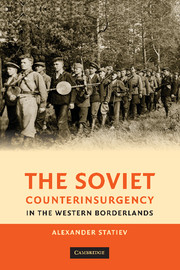Book contents
- Frontmatter
- Contents
- List of Figures
- List of Tables
- Acknowledgments
- Glossary
- Introduction
- 1 Origins of Soviet Counterinsurgency
- 2 The Borderland Societies in the Interwar Period: The First Soviet Occupation and the Emergence of Nationalist Resistance
- 3 The Borderlands under German Occupation (1941–1944): Social Context of the Soviet Reconquest
- 4 Nationalist Resistance after the Soviet Reconquest
- 5 Soviet Agrarian Policy as a Pacification Tool
- 6 Deportations, “Repatriations,” and Other Types of Forced Migration as Aspects of Security Policy
- 7 Amnesties
- 8 Red Rurales: The Destruction Battalions
- 9 Police Tactics: Actions of NKVD Security Units, Intelligence Gathering, Covert Operations, and Intimidation
- 10 The Church in Soviet Security Policy
- 11 Violations of Official Policy and Their Impact on Pacification
- 12 Conclusion: Nationalist Resistance and Soviet Counterinsurgency in the Global Context
- Appendix A Note on Used Terms and Geographic and Personal Names
- Appendix B Note on Primary Sources
- Bibliography
- Index
11 - Violations of Official Policy and Their Impact on Pacification
Published online by Cambridge University Press: 05 May 2010
- Frontmatter
- Contents
- List of Figures
- List of Tables
- Acknowledgments
- Glossary
- Introduction
- 1 Origins of Soviet Counterinsurgency
- 2 The Borderland Societies in the Interwar Period: The First Soviet Occupation and the Emergence of Nationalist Resistance
- 3 The Borderlands under German Occupation (1941–1944): Social Context of the Soviet Reconquest
- 4 Nationalist Resistance after the Soviet Reconquest
- 5 Soviet Agrarian Policy as a Pacification Tool
- 6 Deportations, “Repatriations,” and Other Types of Forced Migration as Aspects of Security Policy
- 7 Amnesties
- 8 Red Rurales: The Destruction Battalions
- 9 Police Tactics: Actions of NKVD Security Units, Intelligence Gathering, Covert Operations, and Intimidation
- 10 The Church in Soviet Security Policy
- 11 Violations of Official Policy and Their Impact on Pacification
- 12 Conclusion: Nationalist Resistance and Soviet Counterinsurgency in the Global Context
- Appendix A Note on Used Terms and Geographic and Personal Names
- Appendix B Note on Primary Sources
- Bibliography
- Index
Summary
A warm heart, a cool mind and clean hands.
– Vladimir Lenin about Felix Dzerzhinsky, head of the Cheka (Later Soviet propaganda referred to all secret policemen with this phrase)
The state often delegates extraordinary powers to local authorities in rebellious regions, hoping this will help them enforce its policy. These officials and police, however, do not completely identify with the government's agenda. They may abuse this power for their profit and be more coercive than the government intends, thereby frustrating the government's effort to balance force and reforms. Totalitarian states conduct pacification with less restraint than democracies because of indifference to civil rights, the low value placed on human life, the supremacy of decrees over law, the tendency to make ideologically motivated and ruthless decisions, and the elevated role of security agencies compared with civilian institutions. In this context, the illegal actions of police and administrators, amplifying the brutality of official policy, may be the last straw in shifting public sentiment in favor of the guerrillas. Random violence committed by representatives of the authorities “defeats deterrence because it destroys the possibility of anticipation of a forthcoming evil and hence the ability to avoid it; it erases the relationship between crime and punishment. … Its sheer unpredictability makes everyone fear lethal sanctions regardless of their behavior; innocence is irrelevant, and compliance is utterly impossible.” People may join the resistance not because they share its ideals but because they cannot stand the government's employees.
- Type
- Chapter
- Information
- The Soviet Counterinsurgency in the Western Borderlands , pp. 272 - 309Publisher: Cambridge University PressPrint publication year: 2010



